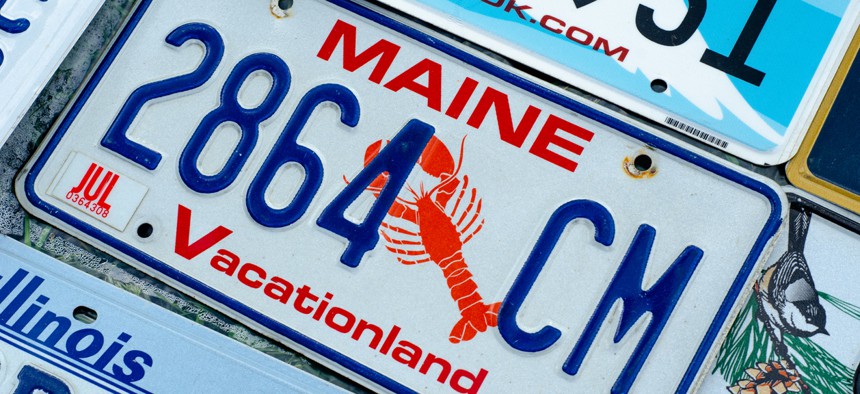One State’s Proposal to Regulate—or Recall—Obscene License Plates

istock.com/artas
Three bills under consideration in Maine would broaden the state’s authority to reject vulgar or obscene vanity license plates, and to recall those already on the road.
Custom license plates in Maine could face tighter content restrictions—or be recalled entirely—for profanity or obscenity under a trio of proposals underway in the state legislature.
Prior to 2015, the Maine Secretary of State had the authority to reject vanity license plate messages that contained “obscene, contemptuous, profane or prejudicial” language. The state’s motor vehicle law was amended that year, narrowing the office’s ability to police only messages that are duplicative, suggest an association with a public institution, or “encourage violence or may result in an act of violence of other unlawful activity.”
Since then, vulgar plates have proliferated, Maine Secretary of State Shenna Bellows said Tuesday at a hearing of the Joint Standing Committee on Transportation.
“We have witnessed a rise in the number of offensive registration plates with explicit profanity, slurs, references to illegal activity and more on Maine roads,” she said. “The secretary of state’s office receives angry calls from parents, and grandparents especially, every week wondering why on earth we are issuing plates with the f-word and more for every child in the state ... to see.”
The vast majority of vanity plates in Maine are acceptable, Bellows added—out of approximately 119,169 on the road, just 421 are estimated to be vulgar or indecent, according to data from her office.
To address the problem, the three pieces of legislation before the committee would create a review process for license plate language, and allow the secretary of state to both reject a vanity plate proposal and recall a plate that's been issued.
Similar proposals have faced legal scrutiny over claims that they restrict free speech, including last year in California, when a federal judge ruled that the state could not govern vanity license plate messages because it considered them “offensive to good taste and decency.”
Profanity, derogatory phrases unacceptable In her testimony, Bellows acknowledged other court cases, suggesting that lawmakers adhere closely to the vanity license plate standards endorsed by the American Association of Motor Vehicle Administrators. Those guidelines advise that “defined and documented criteria for unacceptable license plates” may include profanity, sexual terms, references to acts of violence, and derogatory references to groups “based on age, race, nationality, ethnicity, gender or religion.”
“The unacceptable criteria should be considered when read left to right, right to left, by mirror image, or aloud through phonetic spelling,” the manual says.
But those criteria still violate free speech, said Zachary Heiden, chief counsel for the ACLU of Maine, who testified against all three proposals.
“Government officials are not permitted to censor speech because they disagree with it,” he said. “Some people, no doubt, find public references to penises, vaginas, breasts, buttocks, drugs, deities, sex acts and combinations of the above to be offensive and inconsistent with the kind of state where they wish to live ... But one thing that unites us as a state and as a nation—one of the few things—is our commitment to freedom of expression as a fundamental freedom that is, or ought to be, the birthright of every human being.”
Bellows, former director of the ACLU of Maine, disagreed, telling legislators that because license plates are state property, the state has inherent authority to place limits on what messages they convey.
“A citizen may post a sign on their property or a bumper sticker on their vehicle with the most offensive slogan they choose,” she said. “However, the registration plate is not a bumper sticker, and despite the common misconception that a registration plate is the property of the registrant, it is not in fact private property.”
Sen. Bill Diamond, a Democrat and sponsor of one of the measures, agreed.
“I’m no prude, or someone who promotes big-brother government controlling our lives,” he said. “But what we’re now allowing has gone way beyond the original intent of the vanity plate program … these plates are state property, and we have a responsibility to protect that property and set guidelines on how that property will be used.”
The committee did not rule on the proposals Tuesday. If the bills advance, they would return to the floor for debate.
Kate Elizabeth Queram is a senior reporter for Route Fifty and is based in Washington, D.C.
NEXT STORY: Wildfires Can Poison Drinking Water – Here’s How Communities Can be Better Prepared





